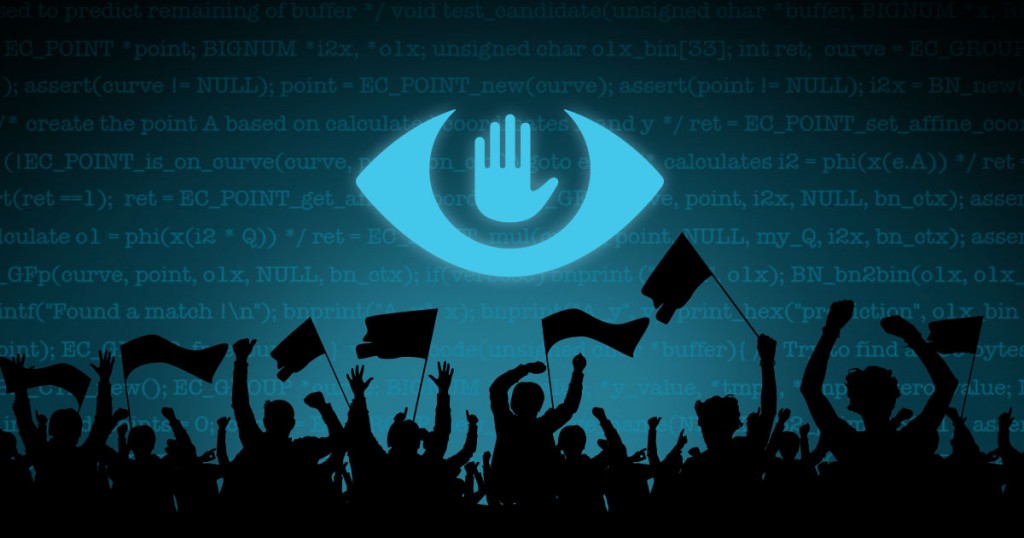 By Joe Wright
By Joe Wright
Over the past several years I have been reporting on the disturbing open-door policies that social media companies have been granting to data collectors of every stripe. These forums for public discussion, debate, and general communications have become a temping source of centralized information for any entity that trades in mining personal information – perhaps most of all, the U.S. government.
The government has used all of the tried-and-true reasons for violating the trust of its citizens in cyberspace: child porn, tracking criminals (and potential criminals), and even the invocation of the health-scare of the week.
One such program of sweeping, real-time data access that was revealed was Twitter’s ChatterGrabber, a “machine-learning algorithm” that could theoretically help detect public health risks based on harvested communications. However, its intent was far beyond the most extreme cases, and researchers never hid the wider applications. The press release stated bluntly:
ChatterGrabber has also been used to monitor tickborne diseases, such as Lyme disease, public sentiment involving vaccines, and gun violence and terrorism, serving as an early warning system for public health officials through suspicious tweets or conversations. (emphasis added)
As if this was not alarming enough, in quick succession it was announced just months later that IBM and Twitter announced a data and analytics partnership, and that MIT would have access to every single tweet from its inception in 2006 in order to “build tools for journalists that would help them monitor trends in media as a way to inform their coverage.” Sounds a lot like identifying new ways to develop more effective propaganda.
Subsequently, social media surveillance has been hitting a lot closer to home for people who may have felt like they had nothing to hide. One key recent example is the nationwide outrage to the Flint water crisis. Regardless of the legitimacy of the concern, police were caught hunting for “subversive communications” about Flint on social media. If that does seem like potentially nefarious activity worthy of State oversight to anyone, then surely the constant vigilance directed toward those little terrorists in training, also known as public school children, should also be supported (here, here, and here).
The truth is, no one can really know just to what extent ongoing data surveillance is being conducted, locally or federally … and it is becoming obvious. The average user now appears to be aware that nearly all modern tech companies have been directly in bed with, or have passively accepted, the intrusion of federal agencies and other entities. This awareness could be manifesting in the recent wave of announcements from these companies that they are willing to only go so far in eradicating user privacy and security.
Consumer protection is the story on the surface at least, and one that each reader needs to determine the truth of for themselves. But even the outward acknowledgement of the overreach is worth noting.
The most recent conflict covers a system that Twitter employs called Dataminr, a company “which uses algorithms and location tools to reveal patterns among tweets.” Twitter owns a stake in the company itself and apparently has been allowing a variety of agencies access to the data without informing its users. Now, however, they are halting that access.
According to cheerleading press such as The Wall Street Journal, the direct access to Twitter has led to key data analysis surrounding the Paris attacks, ISIS terrorism, and political crises.
However, even if the above is assumed to be true, studies are beginning to show the effect that constant surveillance is having upon social interactions and mental health. Conclusions are indicating that in addition to the overt censorship that people tend to fear, it is also the self-censorship which demonstrates just how insidious the surveillance state really is.
Commenting on the effects of authoritarian governments which heavily surveil their citizens, Pen America also notes that, “historically, from writers and intellectuals in the Soviet Bloc, and contemporaneously from writers, thinkers, and artists in China, Iran, and elsewhere—aggressive surveillance regimes limit discourse and distort the flow of information and ideas.” This is without question the intended aim of such programs.
(Source)
 New patterns of communication and expression are developed, and traditionally lead toward mass conformity. Naturally, in modern society it is social media itself that would become most aware of the new usage patterns.
New patterns of communication and expression are developed, and traditionally lead toward mass conformity. Naturally, in modern society it is social media itself that would become most aware of the new usage patterns.
We appear to be at a crossroads between preserving our freedom of expression, or relinquishing it out of the fear of drawing attention to what makes us individuals.
It would be comforting to assume that the tech companies whose products we have purchased in good faith really would have our backs in the fight to remain free. Is this just wishful thinking? Please leave your comments below.
Source: http://phys.org/news/2016-05-twitter-intel-agencies-analysis.html
Also Read:
- Tor Developer Created Malware for FBI To Hack Tor Users
- Former Facebook Workers: We Routinely Suppressed Conservative News
Joe Wright’s articles can be found at ActivistPost.com. This article may be republished in part or in full with author attribution and source link.

Analyze trends….is that what they call it? Ron Paul called it a police state
Hey chattergrabber – here’s my vaccine comment.
VACCINES are POISON.
see : nagalase, cas9/crispr, bacteriophage, ligends and all th human tissue involved growing cultures.
MOMS everywhere STOP giving you child POISON.
(hope the got that).
The NSA has no boundaries. Probably sells “data” to the rest of the world “leaders”.